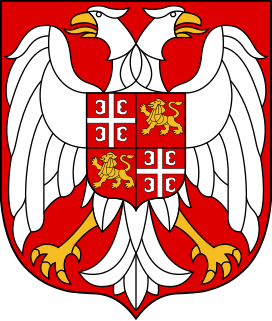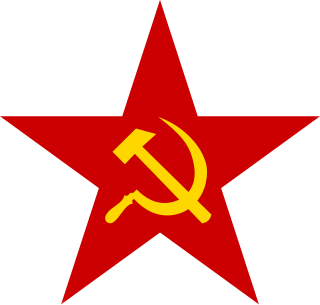
The Politics of Serbia and Montenegro, known as the Federal Republic of Yugoslavia, took place in a framework of a federated parliamentary republic with a multi-party system, and after 2003, in the context of a confederation. The president was both head of state and, following constitutional reforms in 2003, head of government. Executive power was exercised by the Council of Ministers. Federal legislative power was vested in the Yugoslav Parliament.

The Socialist Party of Serbia is a left-wing populist political party in Serbia that identifies as democratic socialist and social-democratic. The Socialist Party of Serbia was the direct descendant of the League of Communists of Serbia. Throughout its existence, the party has utilised some nationalist rhetoric and themes, and has therefore been labelled a Serbian nationalist party, although the SPS has never identified itself as such.

The Democratic Party of Socialists of Montenegro is the ruling political party in Montenegro. It has been so since the introduction of a multi-party system in 1990.

The Socialist People's Party of Montenegro is a socially conservative social-democratic opposition political party in Montenegro. It is part of the Key Coalition, an opposition political alliance in Montenegro. It has 2 of 3 MPs which it won in the 2016 parliamentary election. The party is pro-European Union and anti-NATO.

Milo Đukanović is a Montenegrin politician who has been the President of Montenegro since 20 May 2018. He served as Prime Minister of Montenegro in three governments from 1991 to 1998, as the President of Montenegro from 1998 to 2002, and as Prime Minister again from 2003 to 2006, from 2008 to 2010, and from 2012 to 2016. Đukanović is also the long-term president of the Democratic Party of Socialists of Montenegro, originally the Montenegrin branch of the League of Communists of Yugoslavia, which has governed Montenegro since the introduction of multi-party politics.

Vuk Drašković is Serbian writer and politician. He is the leader of the Serbian Renewal Movement, and served as the Deputy Prime Minister of the Federal Republic of Yugoslavia and the Minister of Foreign Affairs of both Serbia and Montenegro and Serbia.

Liberal Alliance of Montenegro was a liberal Montenegrin nationalist anti-war political party active in Montenegro between 1990 and 2005. The Liberal Alliance was a full member of the Liberal International from 1994 until its dissolution in 2005.
Coalition for a European Montenegro was the ruling political alliance in Montenegro headed by Milo Đukanović's Democratic Party of Socialists (DPS).

Social Democratic Party of Montenegro, or just the Social Democratic Party, SDP) is a centre-left political party in Montenegro. It is the only party in Montenegro to have full membership in the Socialist International.
Nebojša Medojević is a politician in Montenegro. He is the president of Movement for Changes (PzP), a political party emerging from the Montenegrin NGO Group for Changes. He ran for president in the 2008 presidential election of Montenegro.
The Montenegrin Federalist Party, sometimes known simply as the Montenegrin Party, was a Montenegrin political party in the Kingdom of Yugoslavia which stood for preservation of Montenegrin autonomy and a decentralized federalised Yugoslavia. It pursued the ideology of the Greens who lost the Christmas Uprising, but in a peaceful and democratic manner. Its best known leader was Sekula Drljević.
Parliamentary elections were held in Montenegro on 22 April 2001. The result was a victory for the Victory is of Montenegro alliance formed by the Democratic Party of Socialists of Montenegro and the Social Democratic Party of Montenegro, which won 36 of the 77 seats.
Together for Change was a populist political alliance in Montenegro that existed from 2001 to 2006, originally known as Together for Yugoslavia. It based itself upon the necessity for a united Yugoslav state with Serbia. Predrag Bulatović was its wingleader. The pro-European semi-conservative coalition also based itself on economic and democratic reforms, bringing down of the authoritarian regime of Milo Đukanović.
Parliamentary elections were held in Montenegro on 31 May 1998. The result was a victory for the So that we live better coalition formed by the Democratic Party of Socialists of Montenegro, Social Democratic Party of Montenegro and the People's Party of Montenegro which won 42 of the 78 seats.

General elections were held in Yugoslavia on 24 September 2000. They included the presidential election, which was held using the two-round system, with a second round scheduled for 8 October. After the first round, the Federal Electoral Commission announced that Vojislav Koštunica of the Democratic Opposition of Serbia (DOS) was just short of the 50.01% majority needed to avoid a runoff against the runner-up and incumbent president Slobodan Milošević. However, the DOS coalition claimed that Koštunica had received 52.54% of the vote. This led to open conflict between the opposition and government. The opposition organized demonstrations in Belgrade on 5 October 2000, after which Milošević resigned on 7 October and conceded the presidency to Koštunica. USAID subsequently released revised election results with Koštunica having slightly over 50% of the vote.

Andrija Mandić is a Montenegrin politician. He is the President of the major ethnic Serb political party in Montenegro, the New Serb Democracy. He is the Head of the Democratic Front parliamentary club in the Parliament of Montenegro.

Parliamentary elections were held in the Federal Republic of Yugoslavia on 3 November 1996. A coalition of the Socialist Party of Serbia, the Yugoslav Left and New Democracy emerged as the largest bloc in the Federal Parliament, winning 64 of the 138 seats. Radoje Kontić, member of the Montenegrin ruling party, the Democratic Party of Socialists of Montenegro, was confirmed as Prime Minister of the Federal Republic of Yugoslavia. He was replaced, in 1998, by Momir Bulatović, leader of Socialist People's Party of Montenegro.

Yugoslav Communist Party of Montenegro is a communist political party in Montenegro.












